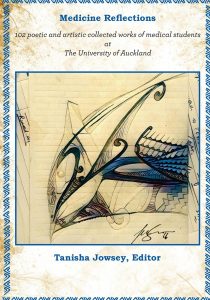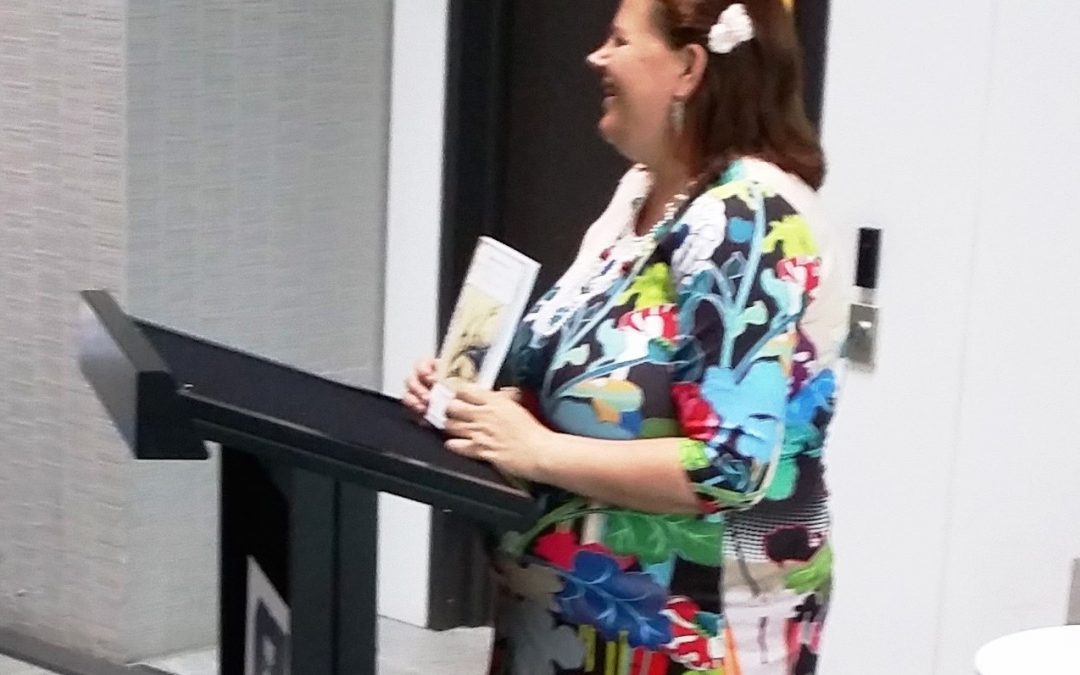Medicine Reflections: 102 poetic and artistic collected works of medical students at The University of Auckland, funded by a SEED grant, edited by Tanisha Jowsey, and published in March this year, offers a kaleidoscopic insight into the lives of medical students. I’m an arts student who knows little about these lives, except through friends and friends of friends. The medical world seems distant from the world of an arts student. For a book to bridge the two – to give poetry weight in a w orld seen most often under the light of science – is exciting.
orld seen most often under the light of science – is exciting.
Medicine Reflections has been given its prologue by Glenn Colquhoun, himself at once a poet and GP. He writes, gently but sharply, of the intersections between people that are so often encountered in medicine:
‘Poems are found at this intersection too. They bring us to it, this edge between things where our skin dissolves. That is why they are useful. They teach us to be. This is the heart of writing. It is the heart of medicine too. Not words. Not needles.’
Empathy, then, is what this book manifests. It’s something I’ve been taught as a history student, when we argue about the dead, but it isn’t something I’ve had to practise while wielding needles or delivering vital news to humans who are quite alive. The student contributors have had decidedly more visceral lessons in empathy over the course of their study; they’ve had to consider, daily, not only how to fulfil their patients’ medical needs but how to speak to and care for their patients on a human level.
I’d assume, though, that these medical students have had little opportunity and encouragement to express their experiences in writing. This project seems unique in the way that it urges students to push over the barriers presented by scientific method and objective thought.
Throughout the book, students deal with the boundaries and connections they find between themselves and their patients. Shan Gunaratna’s poem, ‘I am from’, wrangles the loaded question of nationality and race into a cross-section of a life full of more than birthplace and parentage:
I am from multitudes like trickling veins knitted into currents tumbling into a heart
I am from every wasted hour I spent wishing my skin to be whiter, my eyes lighter, my hair fairer and my name more pronounceable
It’s a reminder that the medical student does not only bring their professional persona to work, but all the rest of them, too. This book offers vignettes of student-patient relationships, interactions with a world that is still new and constantly an intellectual and emotional challenge.
Some of the most poignant student writing pulls apart medical labels to reveal the people they obscure. Sarah Shirley writes, in ‘Poor Historian’,
Mr. Taylor in room 5
can’t remember
if he has diabetes, heart problems, or asthma.
We call him a poor historian
because his history is so poor
but really, that’s on us, isn’t it?
The students use poetry to challenge the system in which, for which they work, to break through the jargon of the medical world beneath which there is the reality of care, identity, inequality, and trauma. They write to come to terms with their own restrictions and those of their profession; they write to destress, to express joy and pain and frustration; if they do not write, they draw and paint and photograph, and this art holds hands with the poetry in the book.
Medical Reflections has been met with enthusiasm by both its readers and its contributors, with Jowsey saying,
The book has been really popular, especially among doctors who have told me that they can really relate to the poetry in the book, to the experiences, emotions, and difficulties that are part of the parcel of their profession. And students whose work was included in the book have reported delight at having their experiences acknowledged… I would very much envisage the project continuing.
Reading Medical Reflections is not only a lesson in interdisciplinary thinking and writing, but a reminder to study with an ear for the human at the heart of the subject, no matter what that subject is.
The book Medicine Reflections is available on Amazon.com in Kindle and Paperback formats.
Read more about SEED Fund grants for innovation in teaching on the CLeaR website. For brief interviews about the funding initiative with CLeaR team and some of the grant recipients, click here.
